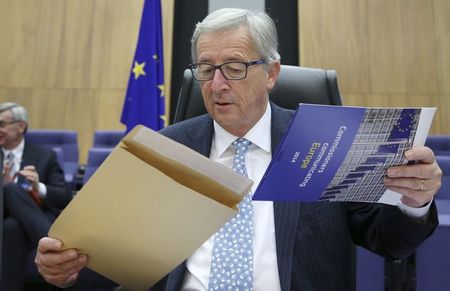By Jan Strupczewski and Matthias Sobolewski
BRUSSELS/BERLIN (Reuters) - The new European Commission president took political responsibility on Wednesday for Luxembourg's role in helping global companies avoid tax and Germany urged swift action to fight tax evasion in Europe.
Jean-Claude Juncker, who served as finance minister and prime minister of Luxembourg for more than two decades, reacted for the first time since investigative journalists reported last week that the tiny state had granted deals to some 340 companies allowing them to avoid tax.
At a time of near record unemployment in the European Union, the affair has overshadowed the start of the new Commission, billed by Juncker as "Europe's last chance" to show citizens the bloc can act in their interests.
The revelations put Juncker under intense pressure to make clear his position on the tax deals and raised questions about whether they create a conflict of interest for him.
"I am politically responsible for what happened in each and every corner and quarter (of Luxembourg)," he said, adding that while in line with Luxembourg and European laws, the tax practices may not have been ethical.
Juncker, 59, said Luxembourg's tax authorities were independent of the government and denied being the brain behind the policies. Global brands such as PepsiCo (N:PEP), Amazon (O:AMZN), insurer AIG (N:AIG) and Deutsche Bank AG (DE:DBKGn) are reported to have benefited from deals with Luxembourg.
"I am not the architect of what you could call the Luxembourgish problem," Juncker told reporters in a surprise appearance at a daily Commission briefing.
"There is nothing in my past indicating that my ambition was to organise tax evasion in Europe," he added.
LUXEMBOURG DEFIANT
The Commission is investigating several tax schemes offered by Luxembourg to large multinational corporations to see if they broke EU laws on state aid.
However, Luxembourg's Finance Minister Pierre Gramegna told German daily Sueddeutsche Zeitung there would be no change to Luxembourg's taxation practices. "Absolutely not," he said.
Juncker said the investigation would be conducted by Competition Commissioner Margrethe Vestager and he would not discuss the case with her to avoid being seen as trying to influence the outcome, which would harm his authority.
Ireland and the Netherlands are also under investigation.
To prevent such situations in the future, Juncker said the EU needed a law on a corporate tax base across the 28-nation bloc, something countries have long opposed.
German Finance Minister Wolfgang Schaeuble sent proposals to the Commission's economics chief to improve the exchange of information on tax deals with companies.
"I would very much be in favour of the European Commission taking the initiative to include information on so-called (tax) rulings in the spontaneous exchange of information," Schaeuble wrote in a Nov. 11 letter.

A German finance ministry spokesman said this coincided with the aim of the Group of 20 leading world economies to combat unfair tax practices.
(Additional reporting by Adrian Croft in Brussels and Alexandra Hudson in Berlin, writing by Robin Emmott; Editing by Gareth Jones)
